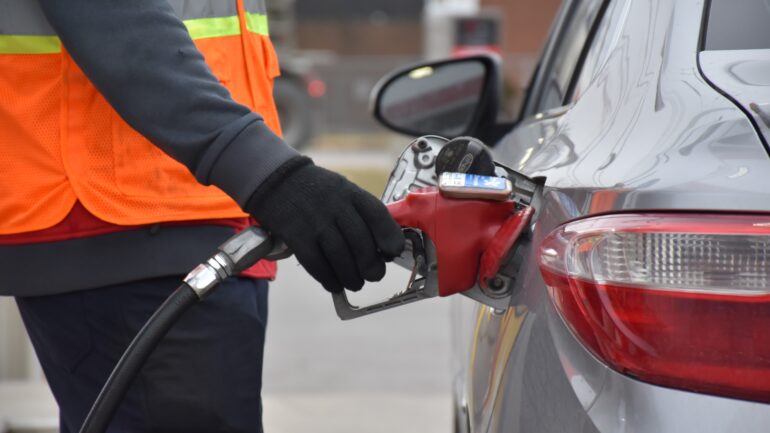Record-breaking retail gas prices are pinching the wallets of Humber College students.
The expense is turning commuting to campus by vehicle into a burden.
“It is heart-wrenching,” said Joon Kim, a second-year traditional Chinese medicine student. Kim’s black GLK250 Mercedes burns $100 worth of gas from Monday to Thursday, about $20 more of what she used to pay before the price hikes.
“It’s terrible, but I have no other choice but to assume it, I have to come to class,” she said. University of Guelph-Humber and Humber College north campus students shared Kim’s experience, as the increases “make a difference” to their weekly expenses.
Victoria Purnwasi, a first-year biotechnology student, said despite having the option of finishing the semester online, she chose to pay about $35 more to fill her tank to attend her hybrid-delivered lectures.
“It’s not ideal, but online learning just makes everything more difficult,” she said. “I decided to work a couple of hours to afford the gas.”
Gas prices are climbing back in Toronto after a 10-day steady decrease that plunged the average retail price to $1.64. Costs per litre are forecast to hit another record-breaking milestone next month as the oil market supply crunch continues and the province braces for a third carbon tax increase on April 1.
The war in Ukraine is also causing jitters among world markets.

The retail price increase is expected to likely soar beyond $1.80, reaching a peak of $2 a litre price during the coming weeks, said McMaster University economics emeritus Professor Atif Kubursi.
Kubursi, an expert on globalization and the oil market, said the price bump at Toronto’s pumps traces back to a worldwide oil supply overtaken by its demand.
“COVID had a bit to do with it as it interrupted supply chains around the world,” he said. “But the impact became absolutely wide, severe, with the Ukrainian-Russian crisis.”
Russia used to be one of the world’s largest crude and refined oil exporters, providing the market with 10-million barrels a day. Kubursi said sanctions and embargoes imposed on the Kremlin, along with the war zone created around the Baltic and Black Sea oil commerce routes, Russia’s energy exports were reduced by 70 per cent.
“The cut of seven million barrels [a day] immediately meant that the [world’s] supply shifted, and that immediately meant a major increase in oil prices,” he said.
Canada’s reliance on Russian imported oil for gas production was at less than five per cent. Yet the fee consumers pay to fill their tanks is regulated by the global price of a barrel of oil, which has been generally rising since the world’s second-largest crude oil exporter invaded Ukraine, Kubursi said.
“Since the war started, it has cost me an extra 30 bucks to fill my tank,” said Jake Housh, a Guelph-Humber business student. The “scary” fuel prices have left the white Toyota Highlander driver with two options: carpooling with classmates or leaving the SUV in the garage.
“Everyone has had to cope with this one way or another,” he said. “But it would be nice if we could get an extra hand.”
MPP Gilles Bisson re-tabled Bill 91 to Queen’s Park for its third time in response to the “out of control” gas prices. The Fairness in Petroleum Products Pricing Act would make the Ontario Energy Board (OEB) responsible for fixing the weekly maximum retail price.
“My colleagues and I brought a bill to protect consumers, to bring about a watchdog,” MPP Faisal Hassan said. “We need to regulate gas prices and end the gouging.”
The weekly minimum mark-up of petroleum products is an attempt by the NDP to prevent a “super-profit” by oil and gasoline retailers.
Under the bill, refineries and service stations will be required to report to the OEB on barrel acquisition expenses, so gas prices stick within a “fair profit,” Hassan said.
“Consumers are being taken advantage of continuously, and no one is speaking for them,” he said. “So, this is a way to improve the lives of everyone in our community and reduce prices.”
On-campus solutions were also adopted by Humber and Guelph-Humber drivers, including riding public transit to use the car only for school.
A suspension or reduction of the parking fee came up as a shared solution to cope with the soaring prices among students.
Khaiula Aboudine, a traditional Chinese medicine Humber College student, said eliminating or reducing parking fees at Humber College could almost make up for the extra $20 she has paid at the pumps since early March.
Humber College’s parking fee starts at $4 for two hours or less. Yet Abouinane’s three-hour lectures and in-campus study sessions cost her $6, two to three times per week.
“This is the time to support students, to play the role, to lower down parking fees,” she said. “For many, changing our commuting habits is not a choice.”

